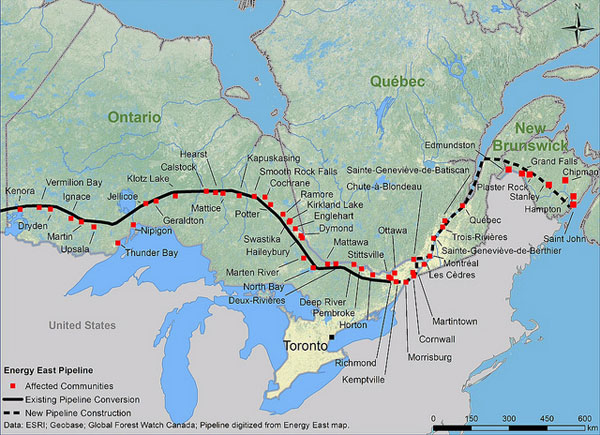Like this column? rabble is reader-supported journalism. Chip in to keep stories like these coming.
Toronto Star columnist Chantal Hébert has commented, “No mayor holds a veto over a pipeline but it will be hard to secure a social licence for any project [including the Energy East pipeline] absent more support from the political leaders who are closest to the day-to-day life of so many voters.”
Last week, the mayors of the 22 biggest cities in this country met and the Energy East pipeline was on the agenda. News reports have carried various quotes from the mayors on the subject.
Regina Mayor Michael Fougere says:
“We would all want to have any new pipeline or any new construction to meet National Energy Board guidelines and their approval process. Once that’s done — and that would of course accommodate discussions on its impact on the environment — once that is completed, I think we would certainly have support for that.”
Winnipeg Mayor Brian Bowman says: “I don’t take an extreme view. I don’t think the question should be if we move oil, it should be how do we do it?”
Peterborough Mayor Daryl Bennett says:
“I am writing to express my support of TransCanada’s Energy East project, a vital infrastructure initiative with economic implications for the Peterborough Region, for a struggling sector of our economy and for our country. …I obviously have an interest in the success of this project on behalf of my community. But please do not take this as unconditional support. …The National Energy Board is collecting the facts, organizing a public hearing process and presenting its recommendations to your cabinet. I am confident that your government will decide based on the facts; then ensure that the National Energy Board has the resources to enforce the regulations for the benefit of our economy and the security of our environment.”
Ottawa Mayor Jim Watson says:
“I think there’s a lot of misinformation out there and we have to do a better job as elected officials, but at the same time I think before anyone jumps to conclusions and jumps on one bandwagon or the other, let the National Energy Board do its work. …It’s about how we get products to market, number one, and how it’s done in the most safe and efficient fashion so that if there is a spill, and there are spills all the time with pipelines as there are train derailments with oil, let’s ensure we have the necessary mechanism to clean up and not denigrate the environment.”
Montreal Mayor Denis Coderre says: “The issue here, it’s not… are we against or for a pipeline, [but] is that project appropriate in the way they are putting it together?”
Laval Mayor Marc Demers says:
“Before taking a position, we did our homework. …We met with the people from TransCanada … and the answers they gave us didn’t assure us. …I don’t think that people in Canada lose their right of speech because they get money from the federal government. I mean, Quebec has been contributing quite a lot to the Canadian economy in the past 10, 15, 100 years.”
Quebec City Mayor Régis Labeaume says:
“I think that in a normal country, all organizations that want to build infrastructure for transporting energy should be able to do it. I am talking about pipelines, but also about electricity transmission. …I wonder how I would feel if a province or a region in another province prevented Hydro-Québec from building its transmission line. I would feel exactly like the people in the West do now. I understand them. …I have to protect the St. Lawrence, protect the waterways and protect the population from a disaster. I have asked a bunch of questions and I haven’t got any answers.… The people of TransCanada are incompetent in the sense that they are unable to answer our questions.”
Smaller municipalities along the pipeline route include: Moose Jaw, Brandon, Portage la Prairie, Kenora, Dryden, Thunder Bay, Longlac, Hearst, Kapuskasing, North Bay, Mattawa, Stittsville, Pembroke, Horton, Kemptville, Cornwall, Trois-Rivieres, Edmundston, Grand Falls, Stanley, Chipman, Hampton and Saint John.
Hébert notes, “Canada has hit upon defining issues that have pitted regions against region in the past. Think of the National Energy Program in the early ’80s, the 1988 free trade agreement with the United States — opposed by Ontario but supported by Quebec and Alberta — and three divisive constitutional rounds. But none of those discussions engaged Canada’s municipal politicians in the way that [the pipeline debate] does.”
The Council of Canadians opposes the Energy East pipeline and encourages you to contact your municipal council — especially if you are on the pipeline route — to express your opposition to the pipeline. For more information, please see our Energy East campaign web page here.
Further reading
Council of Canadians welcomes Montreal Metropolitan Community’s defence of waterways (Jan. 26, 2016)
Like this column? rabble is reader-supported journalism. Chip in to keep stories like these coming.



